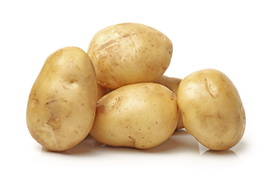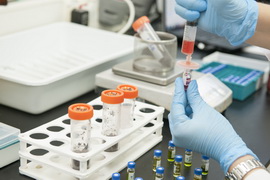|
|
BARI Scientists Apply for Commercial Release of GE Potato in Bangladesh |
 Bangladesh is set to gain from its second biotech crop after Bt brinjal. Scientists from Bangladesh Agricultural Research Institute (BARI) developed a new variety of potato exhibiting resistance to late blight and they have applied for its commercial release. Late blight is one of the most devastating diseases of potato caused by fungal attack. Each year, farmers in Bangladesh spend up to Tk 100 crore (US$12.8M) in applying 500 tonnes of fungicide to protect potato crops from late blight. At present, Bangladesh is the 7th top producer of potato worldwide. Bangladesh is set to gain from its second biotech crop after Bt brinjal. Scientists from Bangladesh Agricultural Research Institute (BARI) developed a new variety of potato exhibiting resistance to late blight and they have applied for its commercial release. Late blight is one of the most devastating diseases of potato caused by fungal attack. Each year, farmers in Bangladesh spend up to Tk 100 crore (US$12.8M) in applying 500 tonnes of fungicide to protect potato crops from late blight. At present, Bangladesh is the 7th top producer of potato worldwide.
|
|
|
|
|
|
|
Researchers Discover Off-Switch to CRISPR-Cas9 Gene Editing System |
 Researchers from the University of California, San Francisco have found a way to switch off the CRISPR-Cas9 gene editing system using newly identified anti-CRISPR proteins that are produced by bacterial viruses. The newly discovered anti-CRISPR proteins could enable more precise control in CRISPR applications, but also provide a fail-safe to quickly block any potentially harmful uses of the technology. Researchers from the University of California, San Francisco have found a way to switch off the CRISPR-Cas9 gene editing system using newly identified anti-CRISPR proteins that are produced by bacterial viruses. The newly discovered anti-CRISPR proteins could enable more precise control in CRISPR applications, but also provide a fail-safe to quickly block any potentially harmful uses of the technology.
|
|
|
|
|
|
|

|
A biweekly update on gene editing research, regulations, and impact
produced by ISAAA Inc. |
| |
|
|

|
| A monthly update on gene drive research and development provided by ISAAA in collaboration with the Outreach Network for Gene Drive Research |
| |
|
|
|
|
GM APPROVAL UPDATES |
- The Philippines approved the canola event LBFLFK for food, feed, and processing.
- The Philippines approved the cotton event GFM cry1A for commercial cultivation.
- Brazil approved the wheat event HB4 for commercial cultivation.
- The Philippines approved the soybean event GMB 151 for food, feed, and processing.
- The Philippines approved the eggplant event EE-1 for cultivation
- The USA approved the canola event MON94100 for food and feed.
|
|
|
|
| Biotech Updates is a weekly newsletter of ISAAA, a not-for-profit organization. It is distributed for free to over 22,000 subscribers worldwide to inform them about the key developments in biosciences, especially in biotechnology. Your support will help us in our mission to feed the world with knowledge. You can help by donating as little as $10. |
|
|
|
|